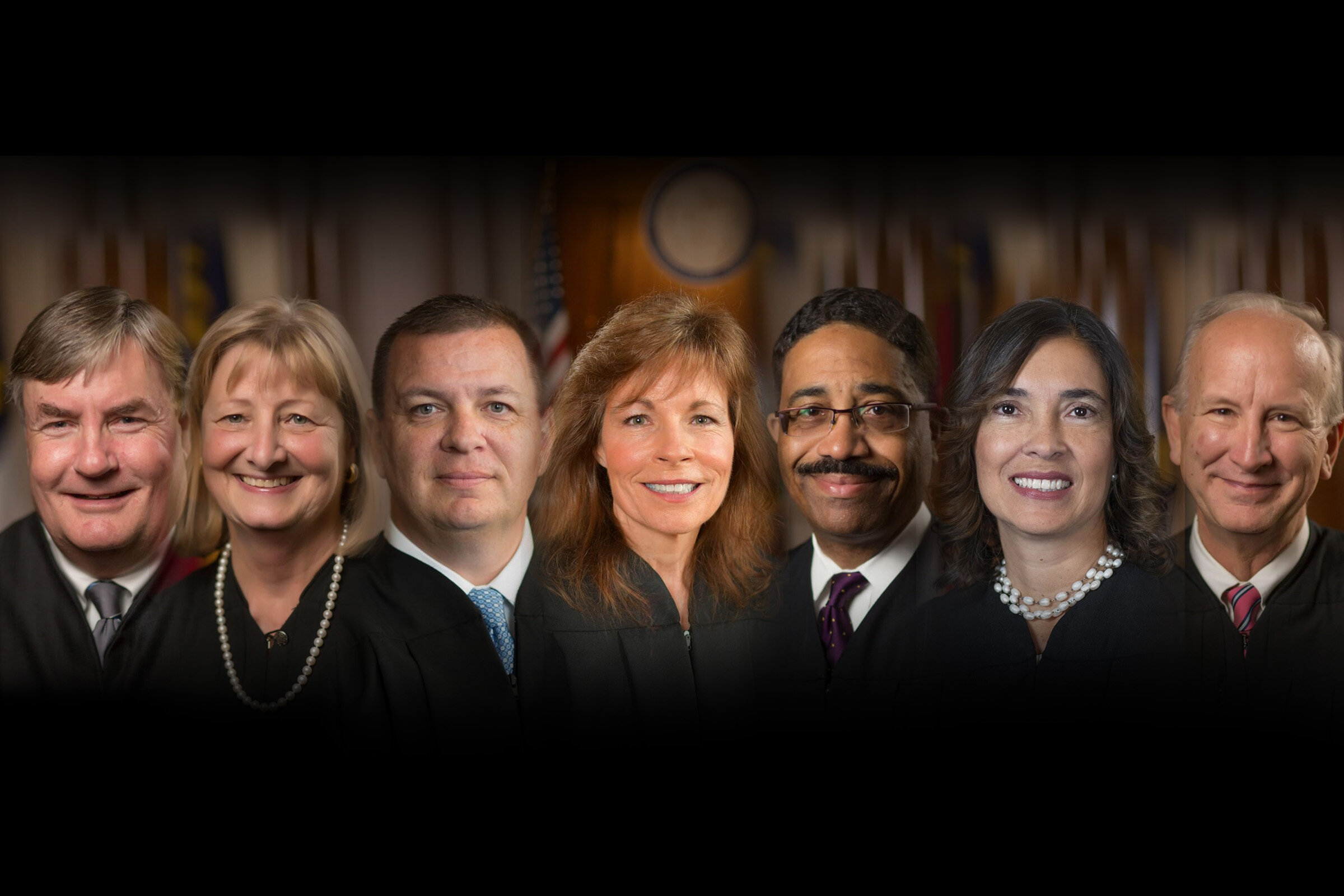OPINION: The Woodshed: Fight over removing Supreme Court justices in voter ID case goes public
By Dallas Woodhouse, The Woodshed, Carolina Journal
A new N.C. Supreme Court order confirms that the court's justices are considering whether to remove two colleagues from hearing a high-profile case involving voter ID. Carolina Journal was first to report that the court's four Democrats were contemplating the move that would block two Republican justices from taking part in the case.
It's a move that could destroy the court for years to come, as CJ reported.
The order issued Tuesday, Sept. 28, highlights the accuracy of CJ's story. It features eight multipart questions for lawyers on both sides of the case known as NAACP v. Moore. The questions are designed to address whether and how the court could remove justices from a case when those justices choose not to recuse themselves.
The questions make clear the targeted justices are fighting efforts to remove them. Asking for briefs on the issue is a way to highlight dangerous efforts by Democrats on the court to upend 200 years of case law for partisan political purposes.
If the four Democrats move forward, they would overturn 200 years of case law and prior precedents. CJ reported that the plan to remove two duly elected Republican Supreme Court justices from the case at hand would nullify N.C. voters’ decision to amend the Constitution.
Without the Republican justices, a temporary 4-1 Democrat majority could erase two constitutional amendments voters approved in 2018. One would require voter ID. The other would lower the state's income tax cap. Both passed overwhelmingly with more than 2 million votes each.
In a plan already in motion, Democrats Anita Earls, Robin Hudson, and Mike Morgan would remove the GOP justices while potentially allowing Associate Justice Sam "Jimmy" Ervin IV to vote AGAINST the move because he is the one Democrat currently on the court who will face re-election in 2022. Hudson's seat is also on the ballot, but she is expected to retire at the end of her current term. The same 3-2 vote would nullify the two constitutional amendments. Both of those amendments received more votes than any candidate on the ballot in 2018.
On July 23, lawyers for the NAACP filed a motion to have Republican Justices Tamara Barringer and Phil Berger Jr. removed from the case.
The NAACP lawyers argue that the Republican justices have a conflict of interest because Berger is the son of state Senate Leader Phil Berger and Barringer was a lawmaker during the time these constitutional amendments passed the legislature by a 3/5ths majority.
Lawyers working for legislative defendants in the case filed a motion opposing the forced removal of Barringer and Berger. The motion pointed out that if the NAACP's objection was really over a conflict of interest, why was there no effort to remove Earls, who was once the attorney for the plaintiffs, the NAACP?
“Plaintiff’s decision not to seek recusal of another justice with actual involvement in this case only undermines its position and calls into question Plaintiff’s real goal in bringing this Motion, which is that a vote of five justices might be better for it than all seven,” the motion read.
Attorneys representing the legislature and those representing the NAACP have 30 days to answer the questions set out in the new Supreme Court order.
The questions posed make clear there are ZERO standards or rules in place for one set of Supreme Court justices to force removal of others, and the four Democrats would just be making them up out of thin air for raw partisan political purposes.
Several of the eight questions presented are particularly noteworthy and serve as strong evidence that the original groundbreaking Carolina Journal report was accurate.
Among the questions posed are several about forced removal of justices who do not believe their recusal is appropriate.
“To the extent that another state’s court of last resort has rules allowing the involuntary recusal of a justice who does not believe that his or her self-recusal would be appropriate, upon what authority were those rules predicated and what process was used to adopt them?”
Question two asks in part:
“Does this Court have the authority to require the involuntary recusal of a justice who does not believe that self-recusal is appropriate?
But the last part of question 2 may reveal two more intriguing issues. The court asks:
"What role do the provisions of the Code of Judicial Conduct play in the making of any such recusal decisions?"
This lends credence to the argument advanced by legislative defendants' lawyers that North Carolina’s Code of Judicial Conduct does not require or support either voluntary recusals or forced removal of justices over these perceived issues. The code is what governs the conduct and ethics of the judicial branch.
The question posed here raises another possibility. The North Carolina Judicial Standards Commission was established in 1973 to consider complaints against judges of the state’s General Court of Justice and, where appropriate, to make recommendations for disciplining judges. The commission also offers guidance to justices about potential conflicts and possible courses of action. Often this guidance is not made public.
It raises a critical question: Are the Democrats on the court about to force GOP justices off a case even though the Judicial Standards Commission has cleared those judges’ participation? We may never know, but perhaps the legislature should move to force the commission to reveal anything they may have advised on this issue.
Most fascinating is this question:
“What enforcement mechanisms exist to ensure compliance with any such involuntary recusal decision?"
What would the Democrats do if the GOP justices refused to be removed and show up for the court hearing? Can a Democratic justice order the court marshals to arrest Barringer and Berger for trespassing in the Supreme Court chambers the voters elected them to serve in? Can Democrats order the Republican justices jailed? Sent to Guantanamo Bay for attempting to participate?
Question five explores the question of legal bootstrapping.
"What, if any, effect should the filing of a motion that a particular justice be recused have upon the process followed in making the recusal decision? Should the justice who is the subject of the recusal motion participate in the determination of that motion by the full court and, if so, on what authority."
Simply put: Can Berger and Barringer be blocked by court Democrats from weighing in on the motion to force them off the case? Are the two justices nullified from having a say not only on the constitutional amendments case itself, but also the efforts to forcibly remove them?
This is an important issue in the politics of this matter. Remember the discussion above that the efforts to force Barringer and Berger off the case is all about protecting Ervin's 2022 re-election bid. Democrats already hold a MAJORITY on the Supreme Court. As legally suspect as it is, the Democrats could just vote now to nullify the amendments without the forced removals on a 4-3 vote. But nullifying millions of votes to amend the state constitution to require voter ID and to lower the maximum income tax rate would be political suicide for Ervin. Keeping Barringer and Berger from EVER being able to vote on their own removal OR the case itself, would mean Ervin would never have to vote on the wrong side politically.
Of course, this is why judges often make poor political candidates and horrific political strategists. The idea that court Democrats could kick off two duly elected GOP justices, nullify two popular constitutional amendments, AND protect Ervin from the political blowback is a complete farce and is unhinged from reality.
Carolina Journal was the first to expose this toxic scheme. The court’s order makes public the current political war devouring North Carolina’s highest court.
It’s a war that if Democrats win, many in the public will be disgusted and demand payback. The war will continue and destroy the court for years to come.
The Woodshed, by investigative political analyst Dallas Woodhouse, is a unique blend of news and opinion based on his expertise and years of experience in North Carolina’s political trenches. For more follow him on Twitter at @DallasWoodhouse



